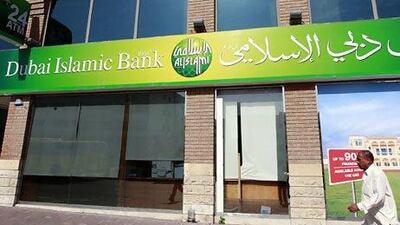Dubai Islamic Bank (DIB) yesterday said it had repaid Dh3.8 billion (US$1.03bn) in debt, lent to it by the Government during the global financial crisis. It is the latest in a string of institutions to start doing so ahead of schedule.
The repayment to the Ministry of Finance of the so-called Tier 2 funds - lent to DIB in 2008 - comes after the lender raised $1bn in "Tier 1 Capital-eligible issuance" last month.
In all, more than half of the Dh42bn lent to the UAE banking sector to help it to get through the crisis has begun to be paid back ahead of the 2016 deadline, data from Arqaam Capital showed last month.
In the past few months, National Bank of Abu Dhabi, Union National Bank and National Bank of Fujairah have announced that they will begin repaying government loans, following similar moves from Emirates NBD, First Gulf Bank, Abu Dhabi Commercial Bank, UNB, RAKBank and NBQ.
About Dh19bn, was classified by the banks as Tier 1 capital. This is of a higher quality to the Tier 2 loans repaid by DIB. To date, none of the Tier 1 loans have been paid back.
"2012 has been a solid year for Dubai Islamic Bank," said Adnan Chilwan, the deputy chief executive. "The bank is now well established on a growth strategy aligning itself to the improved market conditions in Dubai and the UAE.
"DIB's recent $1bn … issuance was extremely well received … [and] has pushed the bank's Tier 1 Capital ratio from 13.9 per cent to 18.7 per cent, based on year-end 2012 balance sheet size, putting us on a strong footing for growth as the market continues to improve."
A Tier 1 capital bond is a particularly complex instrument and "right at the riskier end of what we've seen to date out of the GCC", said analysts last month ahead of the launch.
Tier 1 capital raises are "equity-like", in so far as they are riskier for investors, while as a "perpetual" instrument the security does not have a fixed maturity at which the bond must be repaid.
Institutions across the region have been working to build their Tier-1 capital ratios as the sector rebuilds its financial strength ahead of Basel III regulations.
Abu Dhabi Islamic Bank successfully raised $1bn of Tier 1 capital this year in a deal that was heavily oversubscribed.
DIB had been viewed as riskier by markets because of uncertainties about whether it has finished provisioning for its pre-crisis lending.
It has been viewed as the most thinly capitalised of the UAE's big lenders, and also faces significant costs in absorbing its mortgage lending subsidiary Tamweel - of which it owns 58 per cent.
The Central Bank blocked DIB from paying the shareholder dividend it had sought last year because of its low liquidity, and the lender was forced to cut its payout to investors.
Last week, DIB shares rallied on speculation it would soon obtain approval to acquire the stake it does not already own in Tamweel.
Earlier this year, it bid for the remaining stake by offering the mortgage lender's shareholders 10 DIB shares for every 18 they held.
The bid, which received approval from regulatory authorities and DIB shareholders, is awaiting a nod from Tamweel's minority shareholders.
This month, Fitch Ratings put Tamweel on credit watch positive and affirmed DIB at A, its sixth-highest investment grade.
* With Bloomberg News

